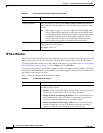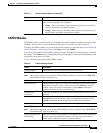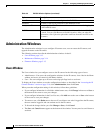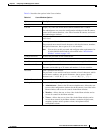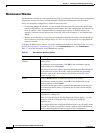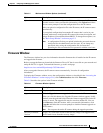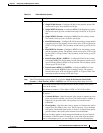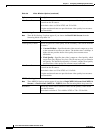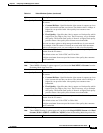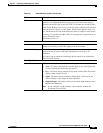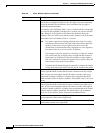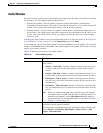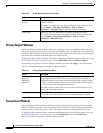
3-17
Cisco Video Surveillance 2630 IP Dome User Guide
OL-24130-02
Chapter 3 Configuring and Managing the IP Camera
Audio/Video Windows
Ta ble 3-9 Video Window Options
Option Description
Streaming Mode Choose the mode that the IP camera uses for video streaming:
• Single H.264 Stream—Configures H.264 for the primary stream. The
stream can be up to D1 resolution and 30 fps.
• Single MPEG-4 Stream—Configures MPEG-4 for the primary stream.
The stream can be up to D1 resolution and 30 fps for NTSC or 25 fps for
PAL.
• Single MJPEG Stream—Configures MJPEG for the primary stream.
The stream can be up to D1 resolution and 30 fps.
• Dual H.264 Streams—Configures H.264 for the primary stream and the
secondary stream. The primary stream can be up to 4 CIF and 30 fps for
NTSC or 25 fps for PAL. The secondary stream can be up to CIF and 15
fps.
• Dual MPEG-4 Streams—Configures MPEG-4 for the primary stream
and the secondary stream. The primary stream can be up to 4 CIF and 30
fps for NTSC or 25 fps for PAL. The secondary stream can be up to CIF
and 15 fps.
• Dual Streams (H.264 + MJPEG)—Configures H.264 for the primary
stream and MJPEG for the secondary stream. The primary stream can be
up to 4CIF and 30 fps for NTSC or 25 fps for PAL. The secondary stream
can be up to CIF and 15 fps.
• Dual Streams (MPEG-4 + MJPEG)—Configures MPEG-4 for the
primary stream and MJPEG for the secondary stream. The primary
stream can be up to 4CIF and 30 fps for NTSC or 25 fps for PAL. The
secondary stream can be up to CIF and 15 fps.
H.264 Settings 1
Note These H.264 Settings options appear if you choose Single H.264 Stream, Dual H.264
Streams, or Dual Streams (H.264 + MJPEG) from the Streaming Mode drop-down list.
Resolution Choose the desired video resolution format for the primary video stream
from the IP camera.
The default resolution is 720 x 480 for NTSC or 720 x 576 for PAL.
Video Quality Control Choose an option for the video quality of the primary video stream from the
IP camera:
• Constant Bit Rate—Specifies that the video stream is output at or close
to the constant bit rate that you choose. The default value is 4 Mbps. A
higher bit rate provides better video quality but consumes more
bandwidth.
• Fixed Quality—Specifies that video is output at a fixed quality, which
ranges from Very High to Very Low. The bit rate may vary to maintain
this quality. The default fixed quality is Normal. A higher fixed quality
provides better video quality but consumes more bandwidth.
You can use these options to help manage bandwidth use in your network.
For example, if the IP camera is focused on an area with little movement,
such as an emergency exit, you can configure it with a low fixed quality.




